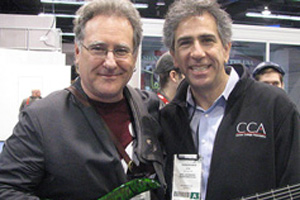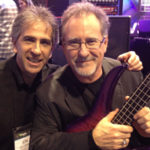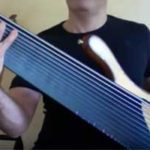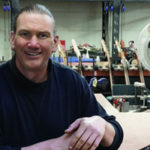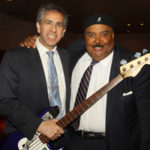Jazz bass superherotalks to FBPO, covering everything from his early days with Stan Getz to designing basses for Peavey, prolific CD output and more!
Exclusive interview with FBPO’s Jon Liebman
November 2, 2009
Born into a musical family in Tucson, Arizona, Brian Bromberg took up the bass in junior high school after stints with the drums and cello. As a teenager, he practiced his upright bass night and day, taking every gig imaginable.
Brian’s first big break came in 1979, when he was hired to play bass for legendary jazz saxophonist Stan Getz. Since then, Brian has toured, performed and recorded with some of the greatest artists of our time, including Dizzy Gillespie, Freddie Hubbard, Bob James, Billy Cobham, Diana Krall, Herbie Hancock, Benny Golson, Larry Carlton, Lee Ritenour, Michael Brecker, Roy Hargrove, Tony Williams and countless others.
Brian has also played on the soundtracks of many Hollywood movies, including The Fabulous Baker Boys, Housesitter, The Preacher’s Wife, Havana, Fat Albert and many more. Brian’s latest CD, It Is What It Is, was released in August 2009.
FBPO: You grew up in Arizona with a house full of drummers. How did you eventually settle on the bass?
BB: Yeah, it was all drums when I was growing up. I actually started playing drums before kindergarten, and was working three nights a week as a drummer from the age of 13.
My parents thought it might be cool for me to learn a completely different type of instrument besides the drums so I could have a more complete musical experience. They thought I should learn an instrument that was more melodic, not strictly rhythmic, so they suggested I play cello. So, from the 4th grade through junior high school, I played cello as well as the drums.
The cello is a lovely instrument but I sucked at it! I could never “get it” with the cello. One day in junior high, my orchestra director came up to me and said, “Hey, Brian! See that big ol’ bass over there? We don’t have any bassists in the orchestra this year and we really need one. Why don’t you give the bass a try?” What he was really saying was that he would much rather have one bad bass player than someone sawing the cello in half, trying to play along with the other cellists in the orchestra who could actually play! So, I went home and talked with my dad and my brother, who were the other drummers in the family, and asked about playing the bass. They both thought it was a great idea because I could play jazz and be able to play with both of them as a bassist. The next day I picked up the bass and that was it. It was like the bass was meant for me. I learned very quickly and literally practiced and played day and night from that point on.
FBPO: As an upright player, how did you adapt to the electric bass? Do you still play in the upper register the same way you would on the upright, i.e., in “thumb” position?
BB: Man, it took me forever to adapt to the electric bass! I was truly an upright bass acoustic music snob in my early playing years. Then one day, I heard Jaco Pastorius. Jaco absolutely messed me up and inspired me to play the electric bass.
When I was eighteen, I got a call from Stan Getz. He asked if I played electric bass. Naturally, I said yes, even though I totally sucked on it!
I had real problems with the electric bass in two ways. The first problem was finding the proper fingerings and positions. Since I was self-taught on the instrument, I had no idea how to go about figuring them out. Up to that point, my whole world had been the upright bass, so I based everything off that. I just moved my upright bass fingerings over to my electric bass. The strange thing was that I could play in the low register, where you play most of the time anyway, and I used my upright bass “thumb” position technique for the upper register. The problem was with the 50% of the notes in the middle of the neck. I could barely play them at all. The electric bass felt like an ironing board to me since I was used to the upright. Even to this day I don’t know the correct fingerings or positions on the electric bass. I just figured out my own way of playing the instrument.
The second way I had problems on the electric bass was with slapping. I almost gave up on trying to slap the bass. It just never clicked or felt right. The problem stemmed from the fact that I was trying to force it, and you can’t force it. My body just didn’t want to slap in the same way I’d seen everyone else do it. Finally, when I learned to listen to my body and relax, I was able to slap comfortably. When I just let my arms and hands relax, allowing them to be where they naturally wanted to be, it all clicked. I may not look as cool as some of the really great slappers, but the end result is what’s most important.
FBPO: Getting the gig with Stan Getz seemed to be the event that jump-started your career. How did it come about? And how old did you say you were?
BB: That was an amazing opportunity, all thanks to Marc Johnson, who was playing bass with the late great Bill Evans at the time. I was eighteen years old and living in Tucson, Arizona, when the Bill Evans Trio came to town for a week of concerts and workshops. I hung out with Marc for the week and he got to hear me play. I had no idea if I was any good or not when I was eighteen, living in a small Arizona town. I was totally blown away when, seven months after hearing me play, Marc recommended me to Stan Getz! It was pretty freaky to be rehearsing with my band in my parents’ house when my Mom walked in the room and said, “Brian, Stan Getz is on the phone for you.” Needless to say, the sax player in the band almost passed out!
It was a great experience for me in so many ways, mostly in the way it helped me grow as a person. I got to travel and see the world. The music and musicians were truly amazing, especially to someone like me, who came from a small town. I had never played with anyone that good before.
FBPO: You’ve toured, performed and/or recorded with some of the most high profile musicians in the business, in addition to all the movie soundtracks you played on. Was there such thing as a “typical” day for you once your career started to take off? What was your life like during those years?
BB: Typical day? Ha! The one thing about being a professional musician is that there is never a typical day! Throughout most of my formative years, my time was spent practicing many hours a day, trying to get gigs and trying to earn a living as a bass player. Needless to say, there were many years where I barely made it, but they were amazing years nonetheless.
What I did learn in those years about being a professional bassist is that you need to understand what “professional” means. You have to remember that you never get a second chance to make a first impression; you also rarely get a second chance if you mess up on a session. You learn quickly that you have to take care of business on your instrument or you will not get another call. The level of musicianship with studio musicians can be remarkably high. For me, that was the fuel that inspired me to be the best I could be.
Trust me, you don’t want to be the one that screws up on a session and have fifty musicians staring at you — and the contractor — with everyone thinking to themselves that no one should ever hire you again because you can’t cut it!
FBPO: In addition to being a performer, you’ve also designed some basses for Peavey. How are they different from other basses?
BB: I guess I have always been kinda into my own thing when it comes to electric basses. I think that stems from the fact that I was totally into upright basses growing up – beautiful woods, everything hand made, no painted finishes… Because of that, I was always drawn to the more exotic wood, handmade bass vibe.
What we did at Peavey was actually quite advanced for its time, state-of-the-art, even. We had essentially put studio quality electronics into an electric bass. The B-Quads are essentially line level. Heck, you don’t even need a direct box or a pre-amp with that bass! It also was a stereo bass with piezo pick-ups. We used a custom Modulus Graphite neck that, to this day, is one of the most comfortable bass necks I have ever played. Those basses were incredibly stable and even and they never needed to be adjusted once you set the action.
I learned a ton about basses and bass players from the B-Quads and my years at Peavey. For the most part, I am very proud of those basses and was looking forward to updating them and doing a more refined model with different woods, materials, pick-ups etc., but it just never happened.
I am in the process right now of developing new versions of my bass. I can’t announce the relationship yet, but I am very excited about the future of the bass line.
One thing about my bass design that makes it different is the shape and its ergonomics. The fact that I am a bass player and I have to play my basses for hours at a time helps me with the design element of my basses. Out of all the basses I’ve helped design, the new versions that we are working on now will be by far the most comfortable basses of them all. When you factor in the woods, pick-ups, electronics and everything else, they’ll be so much more of what most bass players want to play.
FBPO: You’ve been quite prolific in your album releases over the past 20+ years. Some of them are hard-core jazz, some more fusion-oriented and at least one of them is a tribute album (Jaco). Do any of these projects stand out as particularly special or meaningful?
BB: To be honest, I am amazed at my discography. Man, when I was younger and practicing a zillion hours a day and didn’t care about anything else but the bass, I never even thought I would play on an album, let alone record my own! My whole recording career came about almost like divine intervention, meaning that after several unusual events in my life, I found myself making my first solo recording. I was 24 years old and didn’t have a clue of how to do it or what to do. Prior to that, my recording experience was limited to a few demos I had done in the music department at the University Of Arizona.
It’s funny, but when I go back and listen to my older recordings every once in a while, I hear who I was then and who I wanted to be. I made so many mistakes in so many ways back then with styles, song selection, lack of production skills and experience. But even with some of the stupid things you do when you don’t know any better, every once in a while you will play or write something that really does say something. It has taken me a long time to learn how to produce and make records. It has taken half of my recording career to finally feel that I am just starting to scratch the surface of how to do it. There is so much to learn all the time. You can never stop growing and learning.
To your question, all of my CDs are meaningful to me, since I put every ounce of who I am into every one! Even if they suck at times, that doesn’t mean I don’t try as hard as possible to make them sound good.
You mention the Jaco CD. That CD was special for many reasons. One, because the CD was about Jaco, not me. Jaco had more impact on me and the electric bass than anyone, so it was important to me to do a good job. Plus, I got to hang and play with him several times. The personal connection I had with him was special.
The biggest challenge came from the fact that it was supposed to be an All-Star bass player CD with 10-12 famous bass players doing a tribute for what would have been Jaco’s 50th birthday. I was hired to produce the CD, but I was only going to play on one tune, as all of the other songs were to be played by the other featured artists. All of the other bassists that were asked to be a part of the CD bailed out on the project except one. You can’t have an All-Star project with one special guest! So I was kind of left hanging and told the record company I couldn’t deliver the CD they had hired me to do. I felt awful that I couldn’t deliver, since I have such a good relationship with the label, King Records.
It was a Japanese project and idea from the beginning. King told me that I should just finish the CD myself and make it a Brian Bromberg CD. I never had any intention of doing a Jaco CD myself. Who the hell am I to do that? But, that’s what they wanted, so that’s what I did.
Another challenge for me with the Jaco CD was doing the arrangements. This record was about Jaco, but it had to be mine, as well. There was no reason to try and replicate what Jaco did. I couldn’t do it anyway, so why even try? So I made it my CD honoring Jaco instead of me trying to sound like Jaco. That meant different tempos, different time signatures and playing all the different basses I play and not playing fretless bass on most everything. I played upright, piccolo, fretted, fretless, steel string, nylon string, etc. I had to make it mine. The bottom line is that I had the biggest shoes in the bass-playing world to fill, which can’t be done, but I still had to make it stand on its own as a body of work.
Another extremely challenging CD was a completely solo acoustic bass CD called Hands. This CD is another project that was given to me by Susumu Morikawa from King Records in Japan. It was just released in Japan a few months ago. The Hands CD was a daunting task because it was recorded live with no overdubs and is completely solo. It is a truly state-of-the-art audiophile recording, done with three Neumann digital mics, left, center and right. That was it. There was no pickup on the bass, no EQ, no mic pre-amps and no analog signal path at all.
I had the recording project on the books for about six months, but I was so intimated at the scope of doing a solo bass CD that I just took forever to start the project. When I finally forced myself to start making the CD, I had no tunes picked out except one, I think. Once I started playing, I got inspired by how amazing the digital mics sounded on my bass. I just had a great time and went for it! It took a lot longer to record then I expected. Sometimes I would record for hours and get nothing I liked, so I would just leave the studio and come back another day. I don’t know if I will ever do another solo bass recording again. I mean think about trying to make an hour-long bass solo interesting and not boring for the listener! Geez! Still, I’m glad I did it and I am very happy with how it turned out. But man, what a bitch to do!
I also did an Antonio Carlos Jobim-themed project for Japan called In The Spirit Of Jobim. This CD features a lot of my nylon string piccolo bass and upright bass. The cool thing about this CD is that there is a full string section on most of the CD and even a full orchestra on a few tunes. That was seriously fun, let me tell you!
FBPO: Tell me about your new release, It Is What It Is.
BB: It Is What It Is, baby! Well, this CD, for the most part, is just plain fun, funk and groove. I used a ten- and even eleven-piece horn section on eight tunes on this CD. I have never had that before and it was so cool! I wanted to do a CD that featured much more of the electric bass. I wanted the CD to be funky, groove, very live and in your face. It is a very human recording and features mostly my tunes, except two covers and two co-writes. There is no sequencing or drum machine tracks, just human beings playing real instruments. Real drums with the likes of Dave Weckl and Will Kennedy, real piano and keyboards played live by Jeff Lorber, George Duke and Patrice Rushen.
Personally, I think that when you hear the project, you might not have any idea that it’s me on bass unless you really know my style of playing – whatever that is! I love this CD because it just is what it is: high energy and just fun. We are touring, playing the music from the CD and are having a blast!
FBPO: What else is going on with your career these days?
BB: Well, I am totally blessed to be earning a living making music. What an honor and privilege! I am busy doing so many different things, from playing bass, producing records, writing, arranging, designing instruments, teaching, recording and doing sessions and touring. It is quite full and rewarding.
Every day is different and I get to work with so many great musicians and people. I would like to do a book and a DVD of what I do with the basses and how I do it. I would also like to have a book done of solo transcriptions. I think it would be great to have that done on both my acoustic bass solos and my electric and piccolo bass solos from several of my CDs.
Personally, I think some of my best and most melodic playing has been on piccolo bass. Most bass players don’t realize a piccolo bass is still a bass, just like theirs, even though the tuning and strings are different. The fingers go to the exact same places they do on any other bass. If those solos were transcribed, at least bass players could play them on their basses and hear a whole part of what I do that might not be translating on an instrument that really does sound so much like a guitar at times.
As far as career goes, we all just want to earn a living making music with great players and smile. Whatever happens happens. When a door opens, we need to be prepared to walk through it and perform to our highest level and take care of business. If we don’t, the only person we can blame is ourselves.
FBPO: What do you like to do that’s not necessarily musically oriented, assuming you can find the time?
BB: I love nature and the outdoors. I try to go to a few national parks every year, just to get inspired by what is so much bigger than all of us. We need to stop, breathe and realize where we come from and who we are, even if we don’t know the answers.
I also have another love that is diametrically opposed to the beauty and tranquility of nature and that is professional drag racing and motor sports. I go to as many races a year as my schedule will allow. One day I will be involved in professional drag racing in some way. I would love to own or be a part of a professional Top Fuel Dragster team. Until you experience a car with close to 8,000 horsepower, you just can’t understand it. But when you hear it, feel it and smell the nitromethane, you are hooked for life!
Keep up the bottom!
